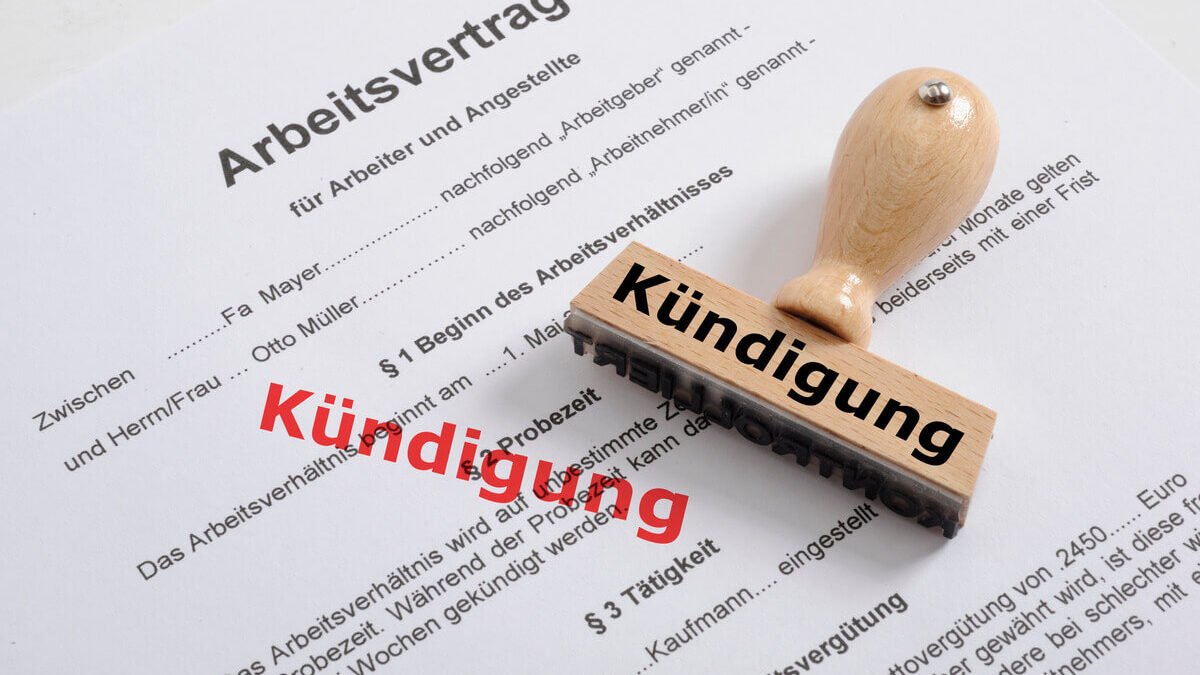

Losing your job is rarely just a legal issue – it hits your finances, your career plans, and often your confidence. Yet the first hours and days after receiving a termination letter are crucial. In Germany, strict deadlines apply: a few days for the Employment Agency, three weeks for a lawsuit, and usually only one shot at negotiating a fair severance pay. At the same time, you need to think about references, open claims, and your next job – or your residence permit if you are on a Blue Card. This guide walks you through seven concrete steps after a termination of employment contract, so you can stay calm, avoid expensive mistakes, and protect your future.
Calculate your severance payment
Calculate the settlement amount for your individual case in 2 minutes
Key takeaways:
- Check the termination letter and delivery date carefully. The exact day starts both notice period and three-week deadline for a lawsuit. However, formal errors (e.g., no hand-written or wrong signatures) can make it invalid.
- Never sign termination agreements on the spot. They almost always waive your right to challenge the dismissal and can trigger a blocking period for unemployment benefits.
- Deadlines apply. You must register as looking for work ASAP. To challenge the termination, a claim must be filed at the labor court within three weeks. More deadlines apply for Blue Card holders.
- Works council and lawyers are leverage, not decoration. A properly involved works council can uncover procedural mistakes and strengthen your position in severance negotiations.
- Secure your future: Open claims, job reference, and time off for job search. List all outstanding payments (salary, bonus, vacation, overtime, esops, etc) and make sure they are covered in a lawsuit or settlement agreement.
Contents
- 1. Check the termination letter
- 2. Do not sign anything
- 3. Contact the works council after termination of the employment contract
- 4. Register as job-seeking and unemployed
- 5. Check if a lawsuit against the termination is worthwhile
- 6. Request a job reference
- 7. Get (paid) time off for job search
- Frequently asked questions (FAQ)
1. Check the termination letter
Imagine getting called into a “quick morning meeting” you weren’t expecting. In the room: your manager, someone from HR, serious faces. Then they hand you a termination letter – maybe even paired with a “friendly” severance agreement they want you to sign on the spot. That is not how your day should start.
Check how the termination letter was delivered
A termination only counts if it was properly delivered. Your employer can hand it over in person – like in the meeting in our example above – or send it by mail. Delivery by mail is where things often get messy. The common methods are:
- Simple postal letter: If sent as normal mail, it’s a problem for the employer. If the employee later claims they never received it, the employer must prove delivery, which is basically impossible. This is why terminations are rarely sent this way. If you got yours by simple letter, talk this aspect through with a lawyer.
- Registered mail – return receipt: You must confirm receipt in writing. If you refuse, the letter goes back as “undeliverable”. The employee could – in theory – simply not pick it up. If the letter is refused or only collected after the deadline, the employer can bear the risk for late delivery. However, courts have treated deliberate non-collection/refusal differently (especially when the employee clearly expects a termination).
- Registered mail – “drop in mailbox” version: The postman drops it directly into your mailbox. Earlier case law said: delivery is complete the moment it hits the mailbox. However, without a “delivery receipt,” (Auslieferungsbeleg), the federal labor court treats a registered mail (drop-in version) similarly to a simple postal letter.1
- Courier or messenger delivery: A courier hands it over and documents the delivery. For the employer, this is the safest option. In most cases, it leaves little to no wriggle-room for the recipient.
Free initial consultation with a lawyer
Quick callback after 1 to 2 hours for a free initial consultation with a lawyer
The date of delivery (see above) is important for two legal deadlines:
Pay attention to the three-week deadline for filing a lawsuit
- When the notice period starts
- When the three-week deadline to file a claim at the labor court begins
Check proper form – must be in writing
A termination is only valid if it is on paper with a handwritten signature (“wet ink”). Verbal notice, email, SMS, WhatsApp, or DocuSign is not legally valid. A stamp or scanned signature is not enough.
Check who signed the letter
If someone other than the employer signed the termination, they often must attach a power of attorney. If it’s missing, the employee can immediately reject the termination under § 174 BGB. This, however, must be done without delay (usually within one week). Employer errors can be healed quite easily. So this can buy you a month or two, but it won’t save your job.
Exception: if it is obvious that the person has authority (e.g. an MD, HR director – or if you were properly informed beforehand).
Check for any special protection against dismissal
General protection against unfair dismissal is pretty strong. Certain groups (e.g., pregnant employees, employees on parental leave, severely disabled employees) have even stronger protection. They can only be terminated with prior approval from the relevant authority. If such approval exists, it is usually mentioned in the letter.
2. Do not sign anything
Many employers push employees to sign documents immediately, often a termination agreement (or at least a “receipt confirmation”). Signing too quickly is one of the most expensive mistakes employees make. A termination agreement usually waives the right to challenge the dismissal in court and may trigger a blocking period for unemployment benefits. Employees are never legally required to sign anything during or after the termination meeting. The correct response is simple: Take the documents home, state that you need time to review them, and obtain legal advice. A “good offer that expires today” – sounds like the oldest trick in the book.
3. Contact the works council after termination of the employment contract
If your employer has a works council, contact them immediately after the termination of the employment contract. The employer must formally hear the works council before any dismissal. If this step is skipped, the termination is already invalid. The works council often has insight into restructuring plans, internal objections, or missing approvals.
If the works council has objected to the dismissal, this could help you big time to obtain continued employment after the notice period ends. Even if you do not want to stay, this leverage often increases the severance amount in settlement significantly.
Free initial consultation with a lawyer
Quick callback after 1 to 2 hours for a free initial consultation with a lawyer
4. Register as job-seeking and unemployed
In Germany, registrations as job-seeking and as unemployed are mandatory, and noncompliance can have consequences. Two deadlines matter:
Within three calendar days after the termination of the employment contract, you must register as “looking for work” (job-seeking, or Arbeitssuchend). Technically, no later than 3 months before the employment ends, and if you learn about the end later than 3 months before, then within 3 days of knowledge.
On the first day after the contract ends, you must register as unemployed (Arbeitslos) and apply for benefits. Both steps can be completed online at the Employment Agency. However, missing either deadline can lead to reduced or delayed unemployment benefits due to a blocking period.2
5. Check if a lawsuit against the termination is worthwhile
A dismissal protection claim aims to have the termination declared invalid. In practice, however, almost all cases settle, and the employee receives a severance payment. This can be significantly higher than if you settle out of court, because employers often prefer a fast separation over a lengthy trial. Your chances in court – and hence the amount of severance – depend on various factors, including:
- If your termination is a regular, “ordinary dismissal” – or if you are terminated without notice (fristlose Kündigung)
- If the Unfair Dismissal Protection Act (KSchG) applies. Different principles apply for fixed-term contracts, during probation, or very small employers.
Chances in the case of ordinary dismissal
Whether a reason for ordinary dismissal is required depends on the legal framework, in particular on the applicability of the Dismissal Protection Act (KSchG). This Act is intended to protect employees from unfair dismissal and specifies the conditions under which ordinary dismissal can be effective. It is applicable if:
- The employee has been employed by the same company or organisation for at least six months without interruption (Section 1 (1) KSchG). The six months of service must have been completed by the time the notice of termination is received.
- No small business (more than 10 employees): The company must regularly employ more than ten employees (excluding trainees)
If both conditions are met, ordinary dismissal is subject to the protection of the KSchG.
Chances in case of dismissal without notice
If you are terminated without notice (fristlose Kündigung), even stricter requirements apply. Which makes sense, because the consequences are even bigger. You don’t just lose your salary from one day to the next – you also risk a three-month unemployment benefit freeze (ALG “Sperrzeit”), which can leave you with zero income for a few months.
That is why most folks in Germany file a claim against a termination without notice. It is not a hostile act – really more self-defense and a completely normal practice. On top of that, the chances of settling (w severance) in court are pretty good, because the legal threshold for a valid termination without notice is high, and many employers prefer to settle rather than risk losing the case.
However, you only have three weeks to file the claim. If you miss that deadline, your chance for severance pay is gone. Details are in our article on termination without notice.
Achtung: The three-week deadline for filing a claim is absolutely non-negotiable. After that, the dismissal becomes legally binding, even if it was clearly unlawful. A single statement of claim filed at the labor court (Klage) initiating the legal claims processing within that period is enough to start settlement talks in earnest. But without that letter, it’s hasta la vista, fair severance pay.
6. Request a job reference
Every dismissed employee is entitled to a written job reference. Even though reference letters have lost some of their importance in recent years, many employers – especially in the public sector, among small and mid-sized companies, and in the countryside – still value them as proof of performance and behavior. If you decide to request one, it must be printed on the company letterhead and signed by hand. Although you can request an electronic version.4
The wording must be truthful and benevolent, meaning no hidden negative codes. To avoid later disputes, prepare your own list of tasks, achievements, and projects and hand it to HR. If you negotiate a settlement agreement, the exact wording of the reference should be included in it to avoid later conflict.

Calculate severance pay now free of charge
- Calculate potential severance payment amount
- Strategy for negotiating a fair severance payment
- Find suitable lawyers for labour law
7. Get (paid) time off for job search
After the termination of the employment contract, employees have the right to paid time off for interviews, assessments, or recruiter meetings. The employer must grant a reasonable release from work and continue paying the salary. You do not have to disclose all details, but must coordinate dates in advance.
Frequently asked questions (FAQ)

Free initial consultation with a specialist lawyer
- Free initial consultation with a lawyer
- Quick callback after 1 to 2 hours
- Strategy for negotiating the severance pay
- Severance pay in Germany: What is the “fair amount”?
- Severance pay calculator
- Action for unfair dismissal: When is it worth taking legal action?
- Overview of the deadline for an unfair dismissal claim
- Jobseeker in Germany: Report termination to the employment office!
- Online appointment with a lawyer specialising in employment law
- Employment lawyer: Tips on how to find the right lawyer in Germany
- BAG 30.01.2025, 2 AZR 68/24 ↩︎
- Section 159 SGB III ↩︎
- Sec. 82(6) Residence Act (AufenthG) ↩︎
- Sec 109 Gewerbeordnung ↩︎




